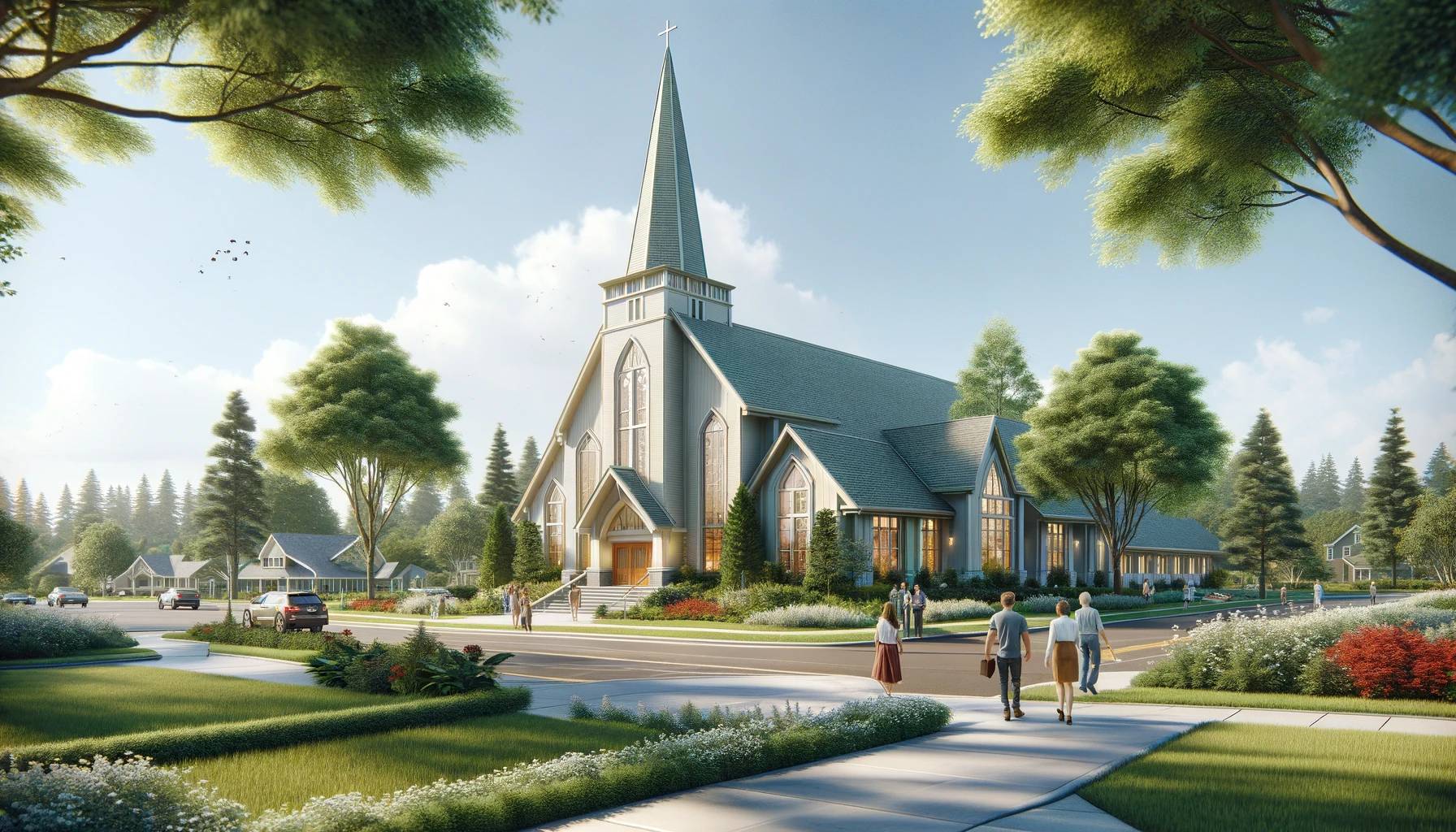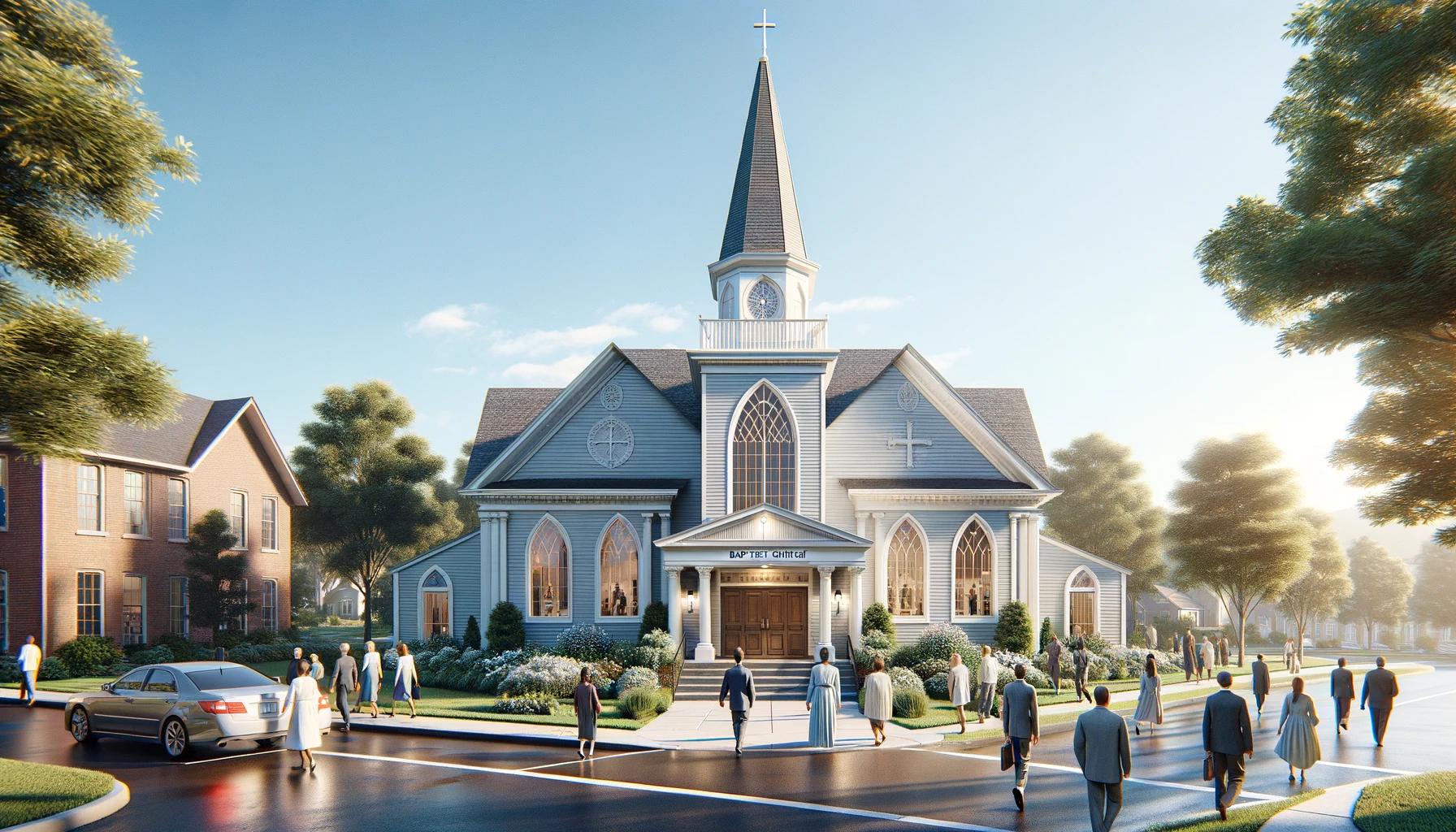Home>Theology and Spirituality>What Is Evangelical Baptist


Theology and Spirituality
What Is Evangelical Baptist
Published: February 20, 2024
Peter Smith, Editorial Director at Christian.net, combines deep insights into faith, politics, and culture to lead content creation that resonates widely. Awarded for his contributions to religious discourse, he previously headed a major organization for religious communicators, enhancing dialogue on faith's societal impacts.
Discover the core beliefs and practices of Evangelical Baptist theology and spirituality. Learn about their unique perspectives on faith and community.
(Many of the links in this article redirect to a specific reviewed product. Your purchase of these products through affiliate links helps to generate commission for Christian.net, at no extra cost. Learn more)
Table of Contents
Introduction
Evangelical Baptist is a vibrant and dynamic Christian denomination that holds a rich history and deep-rooted beliefs. This faith community is characterized by its fervent commitment to the teachings of Jesus Christ and its emphasis on spreading the Gospel message to all corners of the world. The Evangelical Baptist tradition is marked by its dedication to biblical authority, evangelism, and the personal experience of salvation through faith in Jesus Christ.
The Evangelical Baptist movement has played a significant role in shaping the landscape of Christianity, particularly in the United States and other parts of the world. With a focus on individual spiritual transformation and a strong sense of community, Evangelical Baptists have established a distinct identity within the broader Christian tradition.
As we delve into the history, beliefs, practices, and community outreach of Evangelical Baptists, we will gain a deeper understanding of the profound impact this faith tradition has had on the lives of its adherents and the global Christian community. From its humble beginnings to its present-day influence, the Evangelical Baptist denomination continues to inspire and empower individuals to live out their faith with passion and purpose.
Read more: What Is The Evangelical Lutheran Church
History of Evangelical Baptist
The history of Evangelical Baptist traces back to the 17th century when the Baptist movement gained momentum in England. The roots of the Evangelical Baptist tradition can be found in the Anabaptist and Puritan movements, which emphasized the authority of Scripture and the believer's baptism. As the Baptist movement evolved, a distinct group known as Evangelical Baptists emerged, characterized by their fervent commitment to evangelism and the proclamation of the Gospel.
During the Great Awakening in the 18th century, Evangelical Baptist preachers such as George Whitefield and Jonathan Edwards played a pivotal role in igniting spiritual fervor and drawing multitudes to the message of salvation. This period marked a significant turning point for Evangelical Baptists, as their passionate evangelistic efforts contributed to the growth and spread of the denomination across the American colonies.
The 19th century witnessed the expansion of Evangelical Baptist influence, with the establishment of educational institutions and mission organizations aimed at advancing the Gospel both domestically and internationally. The Evangelical Baptist tradition continued to thrive amidst social and cultural changes, maintaining its unwavering commitment to biblical authority and the conversion experience.
In the 20th century, Evangelical Baptists experienced a resurgence as they actively engaged in evangelistic crusades, radio broadcasts, and mass evangelism efforts. The denomination's steadfast adherence to the fundamental tenets of the Christian faith, coupled with its fervor for sharing the Good News, solidified its place as a prominent force within global Christianity.
Today, Evangelical Baptists remain dedicated to upholding the core principles of their faith while adapting to the challenges and opportunities of the modern era. The historical journey of Evangelical Baptists reflects a legacy of unwavering commitment to biblical truth, evangelistic zeal, and a profound impact on the spiritual landscape of countless individuals and communities.
This historical overview provides a glimpse into the enduring legacy of the Evangelical Baptist tradition, serving as a testament to its resilience, adaptability, and unwavering dedication to the proclamation of the Gospel.
Beliefs and Practices
Evangelical Baptists adhere to a set of core beliefs and practices that form the foundation of their faith and guide their spiritual journey. These beliefs are deeply rooted in the authority of Scripture, the centrality of Jesus Christ, and the significance of personal salvation through faith. Here are the key beliefs and practices that define the Evangelical Baptist tradition:
Biblical Authority:
Evangelical Baptists affirm the absolute authority and infallibility of the Bible as the inspired Word of God. They view the Scriptures as the ultimate source of truth and guidance for faith and practice, shaping every aspect of their beliefs and worldview.
Salvation by Grace through Faith:
Central to Evangelical Baptist theology is the belief in salvation by grace through faith in Jesus Christ. They emphasize that salvation is a gift from God, not earned through human effort, and is received by placing one's trust in Jesus as Lord and Savior.
Read more: What Is Evangelism And What Should You Know?
Believer's Baptism:
Evangelical Baptists practice believer's baptism, which involves baptizing individuals who have made a personal profession of faith in Christ. This act symbolizes the believer's identification with Christ's death, burial, and resurrection, and marks their initiation into the community of faith.
Evangelism and Mission:
Evangelical Baptists are deeply committed to sharing the Gospel message with others and engaging in mission endeavors to reach the unreached. They view evangelism as a fundamental responsibility and prioritize spreading the Good News of Jesus Christ to all people, both locally and globally.
Worship and Community:
Worship holds a central place in the life of Evangelical Baptist congregations, characterized by vibrant singing, fervent prayer, and the preaching of God's Word. They place a strong emphasis on the gathering of believers for fellowship, mutual support, and spiritual growth within the context of the local church.
Holiness and Discipleship:
Evangelical Baptists emphasize the pursuit of holiness and the ongoing process of discipleship as essential aspects of the Christian life. They strive to live in accordance with biblical principles, seeking to grow in spiritual maturity and bear witness to the transformative power of Christ.
Read more: Why Do Evangelicals Convert To Catholicism
The Lord's Supper:
The observance of the Lord's Supper, or communion, holds significant importance in Evangelical Baptist worship. This symbolic act commemorates Christ's sacrificial death and serves as a means of spiritual nourishment and unity among believers.
These beliefs and practices form the theological framework and spiritual expression of Evangelical Baptists, shaping their identity as a faith community dedicated to upholding the timeless truths of the Christian faith and actively living out their convictions in daily life.
Evangelical Baptist Church Structure
The structure of an Evangelical Baptist church is designed to facilitate the spiritual growth, community engagement, and effective ministry outreach of its members. While variations exist among individual congregations, there are common elements that characterize the organizational framework of Evangelical Baptist churches.
Congregational Autonomy:
Evangelical Baptist churches typically operate with a congregational form of governance, where each local church exercises autonomy in decision-making and matters of faith and practice. This means that the congregation, comprised of its members, holds authority in determining the direction and policies of the church, guided by biblical principles and the leading of the Holy Spirit.
Pastoral Leadership:
Central to the church structure is the role of the pastor, who provides spiritual leadership, pastoral care, and biblical teaching to the congregation. The pastor plays a vital role in shepherding the church community, equipping believers for ministry, and ensuring the faithful proclamation of the Gospel.
Read more: What Was John The Baptist’s Baptism For?
Deaconate and Leadership Teams:
Many Evangelical Baptist churches appoint deacons or leadership teams to assist the pastor in various areas of ministry, such as pastoral care, outreach, and administrative responsibilities. These individuals work collaboratively with the pastor to support the spiritual well-being and practical needs of the church body.
Committees and Ministries:
Churches often establish committees and ministries focused on specific areas of service, such as missions, discipleship, worship, and outreach. These groups play a crucial role in organizing and implementing various programs and initiatives that contribute to the spiritual growth and holistic development of the congregation.
Worship and Discipleship:
The church structure prioritizes regular gatherings for corporate worship, prayer, and the study of God's Word. These gatherings provide opportunities for believers to engage in meaningful worship, receive biblical instruction, and cultivate a deeper understanding of the Christian faith.
Accountability and Fellowship:
Evangelical Baptist churches emphasize the importance of mutual accountability and fellowship among members. This relational aspect of the church structure fosters a sense of community, support, and encouragement, enabling individuals to grow in their faith and actively participate in the life of the church.
Read more: What Is A Bishop To A Baptist
Mission and Outreach:
A key component of the church structure is its commitment to mission and outreach, both locally and globally. Evangelical Baptist churches often engage in evangelistic endeavors, social outreach programs, and mission partnerships to fulfill the Great Commission and demonstrate Christ's love to the world.
The structure of an Evangelical Baptist church is designed to facilitate a vibrant and spiritually enriching environment where believers can grow in their faith, serve one another, and collectively fulfill the mission of advancing the Kingdom of God. This organizational framework reflects the denomination's commitment to biblical principles, congregational involvement, and the transformative power of the Gospel in the lives of individuals and communities.
Evangelical Baptist Community Outreach
Evangelical Baptist community outreach is a vital expression of the denomination's commitment to embodying the love and compassion of Christ beyond the walls of the church. This outreach encompasses a wide range of initiatives aimed at meeting the spiritual, emotional, and practical needs of individuals within the local community and beyond. Through these endeavors, Evangelical Baptists seek to demonstrate the transformative power of the Gospel in tangible and meaningful ways, reflecting the selfless love and servant-heartedness modeled by Jesus Christ.
Local Engagement and Support
Evangelical Baptist churches actively engage with their local communities by organizing outreach programs that address various social and practical needs. This may include food drives, clothing distribution, and partnerships with local organizations to provide assistance to the homeless, underprivileged families, and individuals facing challenging circumstances. Additionally, these churches often host community events, such as health fairs, educational workshops, and family-oriented activities, to foster a sense of unity and support within the neighborhood.
Counseling and Care Ministries
Recognizing the prevalence of emotional and relational challenges in today's society, Evangelical Baptist community outreach extends to providing counseling and care ministries. Trained volunteers and church staff offer support and guidance to individuals and families dealing with issues such as addiction, grief, marital conflicts, and mental health concerns. These ministries serve as a source of hope and healing, offering a safe space for individuals to receive compassionate care and practical assistance.
Read more: What Is Bedside Baptist
Youth and Family Programs
Evangelical Baptist churches place a strong emphasis on nurturing the well-being and development of youth and families within their communities. They often organize youth outreach programs, after-school activities, and mentorship initiatives designed to provide positive influences and guidance to young people. Additionally, family-focused events, parenting workshops, and marriage enrichment programs are offered to strengthen familial bonds and promote healthy relationships within the community.
Global Missions and Humanitarian Aid
In addition to local outreach efforts, Evangelical Baptist churches are actively involved in global missions and humanitarian aid projects. They partner with mission organizations to support initiatives such as disaster relief, community development, and medical outreach in regions facing adversity and hardship. By extending their outreach beyond geographical boundaries, Evangelical Baptists demonstrate their commitment to addressing global challenges and sharing the love of Christ with individuals from diverse cultural backgrounds.
Collaborative Partnerships
Evangelical Baptist community outreach often involves collaborative partnerships with other churches, non-profit organizations, and community stakeholders. By working together, these partnerships leverage collective resources, expertise, and networks to maximize the impact of their outreach efforts. This collaborative approach fosters a spirit of unity and cooperation, amplifying the effectiveness of community outreach initiatives and promoting holistic transformation within the broader community.
Evangelical Baptist community outreach embodies the core values of compassion, service, and holistic ministry, reflecting the heart of Jesus Christ for the marginalized, the hurting, and the lost. Through these intentional and purposeful efforts, Evangelical Baptists seek to be catalysts for positive change, bringing hope, restoration, and the message of God's love to individuals and communities in need.
Evangelical Baptist in the Modern World
In the modern world, Evangelical Baptists continue to navigate the ever-changing cultural, social, and technological landscape while remaining steadfast in their commitment to the timeless truths of the Christian faith. As globalization and digital connectivity redefine the dynamics of human interaction, Evangelical Baptists have embraced innovative approaches to evangelism, community engagement, and discipleship, seeking to effectively communicate the Gospel message in a rapidly evolving society.
One of the defining characteristics of Evangelical Baptists in the modern world is their proactive engagement with contemporary issues and challenges. With a deep sense of social responsibility and a desire to address pressing concerns, Evangelical Baptist churches have increasingly focused on initiatives related to social justice, environmental stewardship, and ethical living. This holistic approach to ministry reflects a recognition of the interconnectedness of faith and everyday life, as well as a commitment to being agents of positive change in the world.
Furthermore, the modern era has witnessed the integration of technology into the outreach and discipleship efforts of Evangelical Baptist congregations. Utilizing digital platforms, social media, and online resources, churches have expanded their reach and impact, engaging with a global audience and providing accessible avenues for spiritual growth and community connection. This embrace of technology has enabled Evangelical Baptists to adapt to the changing communication landscape and effectively convey the message of hope and redemption in a digital age.
In response to the diverse and multicultural nature of contemporary society, Evangelical Baptists have embraced inclusivity and diversity, seeking to create welcoming and affirming spaces for individuals from various backgrounds. This intentional focus on embracing diversity aligns with the denomination's commitment to reflecting the universal scope of God's love and grace, fostering a sense of unity amidst cultural differences and promoting a spirit of mutual respect and understanding.
Moreover, Evangelical Baptists in the modern world have demonstrated resilience and adaptability in the face of societal shifts and cultural trends. While upholding the foundational principles of their faith, they have embraced innovative forms of worship, community engagement, and ministry outreach, recognizing the need to effectively communicate the unchanging message of the Gospel in ways that resonate with contemporary sensibilities.
As Evangelical Baptists navigate the complexities of the modern world, they remain dedicated to upholding the timeless truths of the Christian faith while embracing relevant and impactful strategies for ministry and outreach. Their unwavering commitment to sharing the transformative message of Jesus Christ continues to resonate in a world marked by rapid change, demonstrating the enduring relevance and power of the Gospel in addressing the deepest needs of humanity.
Read more: What Is A Baptist Religion
Conclusion
In conclusion, the Evangelical Baptist tradition stands as a testament to the enduring impact of a faith community dedicated to biblical truth, evangelism, and compassionate outreach. From its historical roots in the 17th century to its vibrant presence in the modern world, Evangelical Baptists have remained steadfast in their commitment to upholding the core principles of the Christian faith while actively engaging with the ever-changing dynamics of society.
The rich history of Evangelical Baptists reflects a legacy of resilience, fervent evangelism, and unwavering dedication to the proclamation of the Gospel. Throughout the centuries, the denomination has played a pivotal role in shaping the spiritual landscape, contributing to revival movements, global missions, and the establishment of educational and humanitarian initiatives that have impacted countless lives.
The beliefs and practices of Evangelical Baptists underscore a deep reverence for the authority of Scripture, a fervent commitment to sharing the message of salvation, and a strong emphasis on worship, community, and discipleship. These foundational elements continue to guide the spiritual journey of individuals and congregations, shaping their identity as a community of faith dedicated to living out the transformative power of the Gospel.
The structure of Evangelical Baptist churches reflects a commitment to congregational autonomy, pastoral leadership, and vibrant worship and outreach ministries. This organizational framework provides a nurturing environment for spiritual growth, community engagement, and the pursuit of holistic ministry that addresses the diverse needs of individuals and communities.
Furthermore, the modern expression of Evangelical Baptists demonstrates a proactive engagement with contemporary issues, an embrace of technology for outreach and discipleship, and a commitment to inclusivity and diversity. These characteristics exemplify the denomination's adaptability and relevance in a rapidly changing world, as it continues to embody the love and compassion of Christ in tangible and meaningful ways.
In essence, the Evangelical Baptist tradition embodies a timeless message of hope, redemption, and transformation, resonating with individuals from all walks of life. As Evangelical Baptists navigate the complexities of the modern era, their unwavering dedication to sharing the Gospel message serves as a beacon of light in a world seeking meaning, purpose, and spiritual fulfillment.









